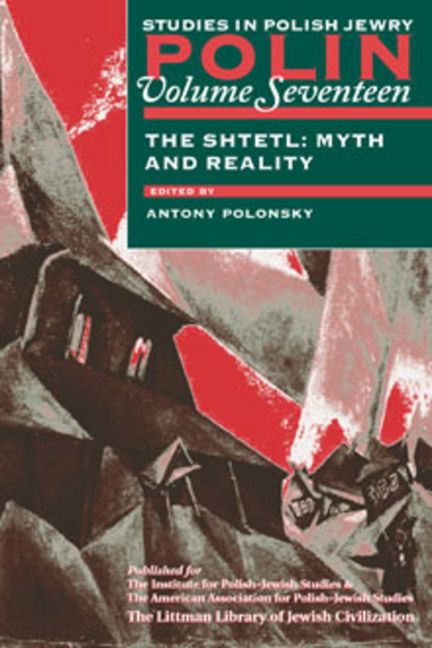Book contents
- Frontmatter
- Dedication
- Editors and Advisers
- Preface
- Polin
- Polin: Studies inPolish Jewry
- Contents
- Note on Place Names
- Note on Transliteration
- List of Abbreviations
- PART I THE SHTETL: MYTH AND REALITY
- PART II NEW VIEWS
- PART III DOCUMENTS
- PART IV THE SIXTY-FIFTH ANNIVERSARY OF EVENTS IN PRZYTYK: A DEBATE
- PART V REVIEWS
- Chone Shmeruk, Hakeriyah lenavi: meḥkerei historiyah vesifrut, edited by Israel Bartal; Chone Shmeruk, Ayarot ukerakhim: perakim beyetsirato shel shalom aleikhem, edited by Chava Turniansky
- Anna Michałowska, Między demokracją oligarchią: Władze gmin żydowskich w Poznaniu i Swarzędzu
- Magdalena Sitarz, Yiddish and Polish Proverbs: Contrastive Analysis Against Cultural Background
- Shmuel Feiner and David Sorkin (eds.), New Perspectives on the Haskalah
- Brian Porter, When Nationalism Began to Hate: Imagining Modern Politics in Nineteenth-Century Poland
- Irena Janicka-Świderska, Jerzy Jarniewicz, and Adam Sumera (eds.), Jewish Themes in English and Polish Culture
- Nancy L. Green (ed.), Jewish Workers in the Modern Diaspora
- Gertrud Pickhan, ‘Gegen den Strom’. Der Allgemeine Jüdische Arbeiterbund ‘Bund’ in Polen, 1918–1939
- Anna Cichopek, Pogrom Żydów w Krakowie, 11 sierpnia 1945 r.
- Michał Horoszewicz, ‘Przez dwa millenia do rzymskiej synagogi’: Szkice o ewolucji postawy Kościoła katolickiego wobec Żydów i judaizmu
- OBITUARIES
- Notes on the Contributors
- Glossary
- Index
Brian Porter, When Nationalism Began to Hate: Imagining Modern Politics in Nineteenth-Century Poland
from PART V - REVIEWS
- Frontmatter
- Dedication
- Editors and Advisers
- Preface
- Polin
- Polin: Studies inPolish Jewry
- Contents
- Note on Place Names
- Note on Transliteration
- List of Abbreviations
- PART I THE SHTETL: MYTH AND REALITY
- PART II NEW VIEWS
- PART III DOCUMENTS
- PART IV THE SIXTY-FIFTH ANNIVERSARY OF EVENTS IN PRZYTYK: A DEBATE
- PART V REVIEWS
- Chone Shmeruk, Hakeriyah lenavi: meḥkerei historiyah vesifrut, edited by Israel Bartal; Chone Shmeruk, Ayarot ukerakhim: perakim beyetsirato shel shalom aleikhem, edited by Chava Turniansky
- Anna Michałowska, Między demokracją oligarchią: Władze gmin żydowskich w Poznaniu i Swarzędzu
- Magdalena Sitarz, Yiddish and Polish Proverbs: Contrastive Analysis Against Cultural Background
- Shmuel Feiner and David Sorkin (eds.), New Perspectives on the Haskalah
- Brian Porter, When Nationalism Began to Hate: Imagining Modern Politics in Nineteenth-Century Poland
- Irena Janicka-Świderska, Jerzy Jarniewicz, and Adam Sumera (eds.), Jewish Themes in English and Polish Culture
- Nancy L. Green (ed.), Jewish Workers in the Modern Diaspora
- Gertrud Pickhan, ‘Gegen den Strom’. Der Allgemeine Jüdische Arbeiterbund ‘Bund’ in Polen, 1918–1939
- Anna Cichopek, Pogrom Żydów w Krakowie, 11 sierpnia 1945 r.
- Michał Horoszewicz, ‘Przez dwa millenia do rzymskiej synagogi’: Szkice o ewolucji postawy Kościoła katolickiego wobec Żydów i judaizmu
- OBITUARIES
- Notes on the Contributors
- Glossary
- Index
Summary
Brian Porter's ground-breaking study of Polish national thought from the time of the partitions to the advent of mass-based political parties is a provocative and brilliant must-read for all those interested in Polish history, Polish politics, and the place of ‘the Jews’ in both of these constellations. Throughout the work Porter strikes a judicious balance between the extensive historical material and the relevant theoretical literature without falling prey to the obscure jargon that often handicaps theoretical approaches to nationalism. Furthermore, by slaughtering some of the sacred cows of Polish historiography, Porter helps to demystify some of the more mythical (and therefore less academic) aspects of contemporary Polish historiography (pp. 10–14). The end result is an evocative, forceful work of passion and intellect.
Throughout his book Porter carefully and persuasively traces the various permutations of Polish national thought from its early romantic stages in the first half of the nineteenth century to its authoritative, disciplinary form in the early twentieth. He argues that the transition from a timeless, romantic concept of the nation to one rooted in the present and designed to achieve specific political goals was the turning point in the development of Polish national thought. Thus, he claims that ‘perceptions of historical time—the way people conceptualize history and prophecy, the means by which they plot their lives vis- á-vis the past and the future—structure and limit how the nation can be imagined’ (p. 8). This innovative analysis of time, teleology, and politics represents the book's most important contribution to the ever-growing body of literature on nations, nationalism, and national movements.
By placing the nation in a mythical realm that lay beyond time, early nineteenthcentury Polish thinkers were able to construct ‘a community with remarkably fluid boundaries’ (p. 16). This concept of the nation as an ideal and not as a specific social space helped to create a society that was conspicuously open to non-Poles (i.e. the Jews). As a result, ‘Polish nationalism in the period from 1830 to 1863 was more inclusive than it had ever been before or perhaps ever would be again’ (p. 37).
- Type
- Chapter
- Information
- The Shtetl: Myth and Reality , pp. 429 - 431Publisher: Liverpool University PressPrint publication year: 2004

